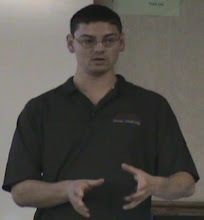Looks like D-Wave has a developer kit setup for Python, as outlined in this tutorial on their site: http://www.dwavesys.com/en/dev-tutorial-finance.html. Looks like they realized the same thing I did: to really be applicable for the commercial environment quantum computers need to be programmed via frameworks and not new quantum specific languages.
When I started work on Cove I actually started doing the implementation in both Python and C#. I quickly realized that was creating a lot of unnecessary work for myself and quickly abandoned the Python implementation. My reason for settling on C# was largely that the libraries could be used by multiple languages. However, I still think Python is a great candidate- Python's readability and simple learning curve make it a natural choice.
Tuesday, January 17, 2012
Monday, December 12, 2011
Quantum chip out of Bristol
They've made some recent progress at Bristol University, making a small quantum chip. Some articles:
- TechEye
- Crazy Engineers
- ZME Science
- And of course,
 the Bristol press release.
the Bristol press release.
Tuesday, November 15, 2011
Q & A with Seth Lloyd
Here's a short question and answer with Seth Lloyd of MIT in Popular Science. As one would expect, this is more of a primer being in PopSci.
Tuesday, October 25, 2011
More progress

More progress, from the National Science Foundation: Tiny crystal towers enlighten understanding of photon emission, could inspire diamond microchips for quantum computing. (Image from the release.)
Saturday, August 27, 2011
Maintaining Entanglement for an Hour

Maintaining quantum states for any length of time is one of the big challenges in quantum computing. So this news about maintaining entanglement for an hour is encouraging. (Image from the article.)
Monday, July 25, 2011
Suppressing decoherence
Some progress towards suppressing decoherence, a major stumbling block towards physical implementations of quantum computers.
Subscribe to:
Comments (Atom)
